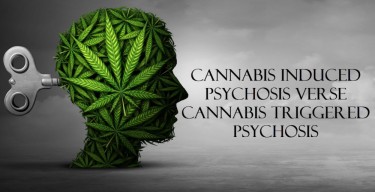
No increase in psychosis due to cannabis legalization, says new study
A person can develop psychosis through the use of psychedelics, meditation, or profound spiritual encounters. The experience itself can give you the impression that you are experiencing a parallel reality in which the boundaries between time and space are dissolved and you are exposed to new dimensions of meaning. It’s a fascinating, unsettling, and often frightening experience as you struggle to process fresh, powerful sensory information while losing touch with everyday reality. You may think that you are receiving signals from more spiritual planes of existence or that you know things that others do not. Even the most disorganized and confusing facts can be processed and understood by the human mind, but it can be time-consuming, painful, and unpredictable. When studying altered states of consciousness, psychedelics can be a useful tool, but you should be prepared for the risk of crossing a boundary you can’t get away from.
The human mind tends to look for connections and patterns everywhere. Unfortunately, when it comes to understanding cause and effect, this predisposition can get us into trouble. It’s not always that one thing leads to another just because two things are related. The association can be purely coincidental or the result of an underlying third element. This is a fundamental tenet of scientific inquiry, but one that is often neglected in our rush to understand a complicated world. We run the risk of misinterpreting the data and drawing the wrong conclusions if we infer causality and effect from correlation alone. So if you notice a correlation, step back and think about all the other variables that might play a role. Then you can begin to develop a thorough understanding of the causes.
The idea of cannabis and psychosis that has been drummed into our heads for the past several decades has been the subject of a recent study examining the literature. It’s interesting that they didn’t detect, or at least didn’t observe, an increase in psychosis in cannabis users. Consequently, the notion that cannabis causes psychosis is unfounded.
That’s not to say that a strong marijuana high can’t serve as a trigger for someone to engage in psychotic behavior, but it’s definitely not what triggered it.
There has been much debate in the field of cannabis studies about its possible association with psychosis. While research has linked extended cannabis use to an increased risk of schizophrenia, the causal relationship between the two conditions is still a matter of debate. Understanding the potential health effects of cannabis use is crucial given the legalization of medical marijuana in many countries, the drop in price and the rise in THC levels. In this study, the authors examined the relationship between state cannabis legalization rates and psychosis-related health insurance claims of private individuals. They discovered that jurisdictions that allowed commercial sales and recreational activities may have higher rates of antipsychotic prescriptions and diagnoses of psychosis. The authors also accounted for variations in results due to gender, age, and race/ethnicity.
Over 63 million people were tracked in the study and 2 billion person-months of data were collected. Females accounted for most of the follow-up period, accounting for almost 77% of recorded person-months in those aged 65 and older and 64.6% in White recipients. The analysis revealed 20.8 million antipsychotic prescriptions filled and 7.5 million diagnosed psychoses. Cannabis was legal in 29 states for either medicinal or recreational use. Unlike states with no policy, those with legalized cannabis did not have significantly higher rates of antipsychotic drug prescriptions or diagnoses related to psychosis, according to the results of the multivariate study.
Let me simplify this because it might all sound a bit complicated.
This study looked at a large number of people and collected extensive data about them. They discovered that many people had been diagnosed with psychosis and had been treated with medication. Recreational or medicinal use of cannabis is legal in some US states. However, they found that there was no difference between states with and without legalizing cannabis in the number of patients diagnosed with psychosis or prescribed treatment.
And it has always been like that from the start. You see, the idea that marijuana causes psychosis isn’t entirely new. It’s been marketed since the beginning of Reefer Madness. Although governments are using this to support their cannabis ban, there have been no notable changes since legalization.
This study effectively shows that while cannabis can act as a catalyst, it is not the cause of a problem. This is crucial as alcohol itself sometimes acts as a catalyst. That’s what a bad breakup can be like. These things do happen, and a person predisposed to psychosis would be vulnerable in any given circumstance.
The subject of limiting the many to preserve the few is complicated and divisive and has been debated for ages. It has always been difficult to strike a balance between upholding individual freedom and serving the common good.
To “protect” their residents, many governments and groups have justified restricting basic human rights; yet the distinction between security and tyranny is often blurred. A lack of intellectual diversity and the repression of opposing viewpoints can result from restrictions on personal liberties, including freedom of speech, movement and assembly.
History has shown that these limitations often lead to negative outcomes. For example, the government in Nazi Germany justified the expulsion of Jews as a measure to preserve the “purity” of the German race, but actually resulted in the systematic killing of millions of people. Much like today’s Red Scare, which took place in the United States in the 1950s and saw the government cut the rights of those believed to be communists, this led to the repression of innocent individuals and a horrifying impact on freedom of expression .
In addition, crowd restraints are often used to protect the interests of the powerful and wealthy. Voting restrictions and political repression are often used to maintain the status quo and protect the authority of those responsible.
In addition, it is important to recognize that underprivileged communities are often disproportionately affected by such restrictions. For example, low-income and communities of color have been shown to suffer greatly when their freedom of movement and association is restricted in response to public health emergencies.
The ban on cannabis makes this clear. The people most at risk are often those most affected by this legislation. If cannabis use is to be restricted because “some people may experience a psychotic reaction,” we must consider the impact on the underprivileged and oppressed.
This is not to say that we should abandon those suffering from mental illness. Of course not, we should take care of them and make sure they are aware of all possible consequences of smoking.
You are responsible for your physical and mental well-being. Nobody knows your body better than you do. For this reason, take full responsibility for your health and only put things into your body that you fully understand and are comfortable with. And let’s face it, this is especially true for pharmaceuticals.
You have to be your own gatekeeper when it comes to taking narcotics. They don’t always have your best interests at heart, whether it’s the government or big pharma. In fact, there are moments when they don’t even know what they’re doing. Studies on psychosis and marijuana use are a good example of this, as they tend to favor a specific narrative over a fact-based assessment of the evidence. Consequently, it is up to you to do your own research, formulate thoughtful investigations, and make judgments.
I’m also aware that it’s easier said than done. In this day and age, it’s rare to go a day without hearing from a supposed expert what’s and isn’t healthy for you. But in the end, you’re the one who has to deal with the effects of the things you put into your body.
So show courage. Take responsibility. Don’t just eat what any suit tells you to without question. Do your own homework, dammit. Most importantly, believe your gut instinct. Something is probably wrong if it doesn’t feel right.
However, I’m not suggesting that you go rogue and start experimenting with harmful chemicals. This will only lead to disaster. But I’m saying that you shouldn’t be afraid to investigate things, ask about alternatives, and make decisions that you feel are in your best interests regarding your health and well-being.
So remember, my friends, that you are in control of your health and well-being. Never let anyone else guide you in a direction you are not comfortable with. And remember, in the end, you are the only one who has to live with the choices you make.
MARIJUANA AND PSYCHOSIS, READ MORE…

CANNABIS-INDUCED PSYCHOSIS VS. TRIGGERED PSYCHOSIS

Post a comment: